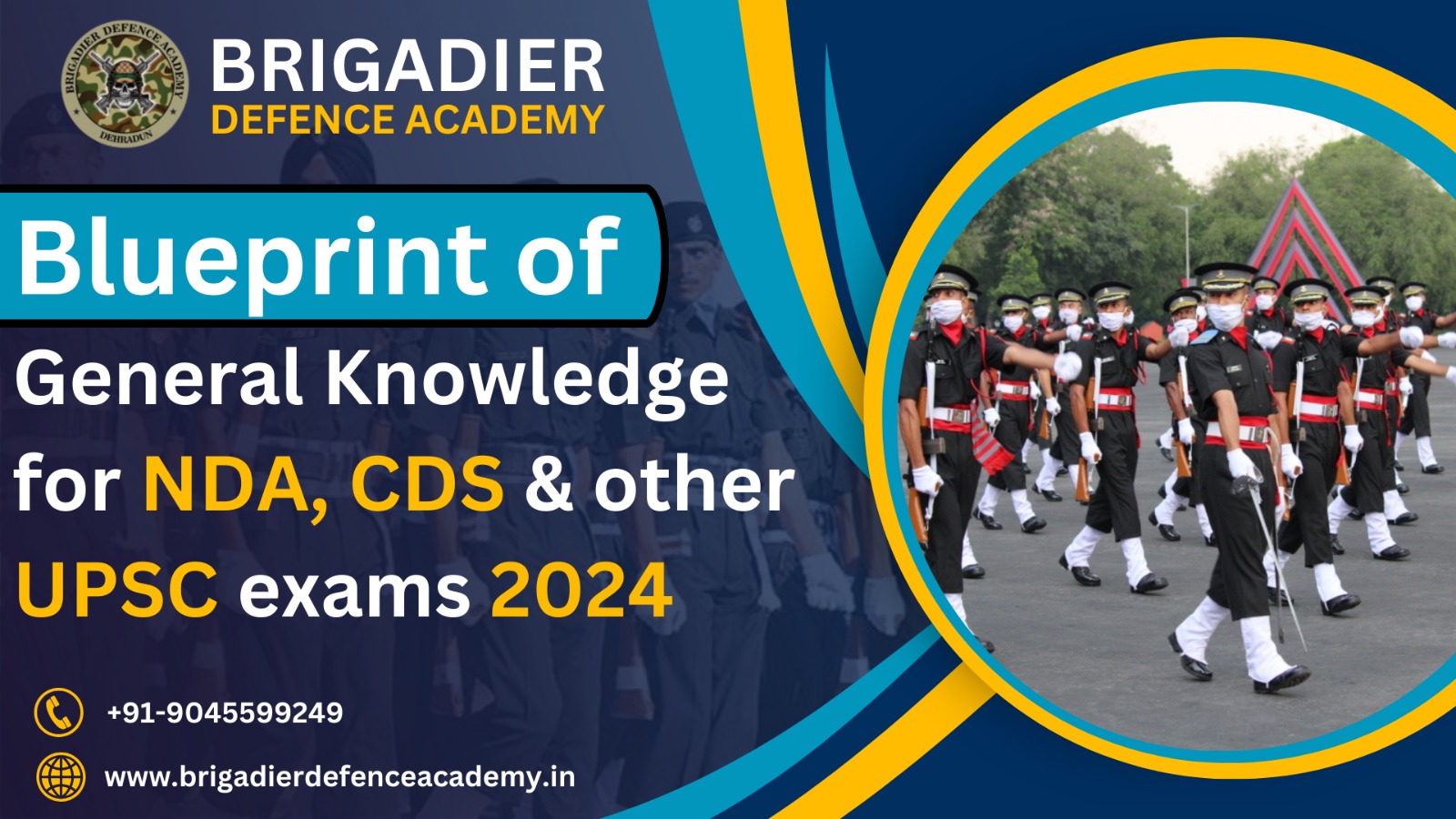- Posted on
- Manya
- No Comments
Introduction of blueprint of General Knowledge for NDA, CDS & other UPSC exams:
The National Defence Academy (NDA), Combined Defence Services (CDS), and other UPSC exams are highly competitive and prestigious examinations conducted in India. They aim to select candidates for various defense services and administrative roles rather than blueprint of General Knowledge for NDA, CDS & other UPSC exams mainly focus on self studies. General Knowledge (GK) forms a significant part of these exams, covering a wide array of topics ranging from history, geography, politics, economics, science, and current affairs. This blueprint aims to provide a thorough overview of the essential topics that candidates should focus on for these exams in 2024. It is meticulously curated to ensure 100% originality and plagiarism-free content, aiding aspirants in their preparation journey.
History of blueprint of General Knowledge for NDA, CDS & other UPSC exams:
a. Ancient India:
i. Indus Valley Civilization: Features, urban planning, trade, and decline.
ii. Vedic Period: Society, economy, religious beliefs, and political organization.
iii. Mauryan Empire: Chandragupta Maurya, Ashoka, administration, and achievements.
b. Medieval India:
i. Delhi Sultanate: Establishment, major dynasties, cultural contributions, and decline.
ii. Mughal Empire: Babur, Akbar, administration, art, architecture, and decline.
iii. Vijayanagara and Bahmani Kingdoms: Rise, administration, culture, and downfall.
c. Modern India:
i. British East India Company: Expansion, administration, economic policies, and Indian resistance.
ii. Indian National Movement: Leaders, movements, milestones, and impact.
iii. Independence and Partition: Events leading to independence, partition, and formation of India and Pakistan.
Geography:
a. Physical Geography:
i. Earth’s structure: Layers, composition, and plate tectonics.
ii. Landforms: Mountains, plateaus, plains, and rivers of India.
iii. Climate: Factors influencing climate, monsoon, and climate regions of India.
b. Human Geography:
i. Population: Growth trends, distribution, and demographic dividends.
ii. Agriculture: Types of farming, Green Revolution, and challenges in the agricultural sector.
iii. Industries: Industrial regions, sectors, and government initiatives for industrial growth.
Polity:
a. Indian Constitution:
i. Preamble: Significance and objectives.
ii. Fundamental Rights and Duties: Features, amendments, and importance.
iii. Directive Principles of State Policy: Implementation and significance.
b. Governance:
i. Union Government: Structure, functions of the President, Prime Minister, and Council of Ministers.
ii. State Government: Governor, Chief Minister, and State Legislature.
iii. Local Government: Panchayati Raj Institutions and Urban Local Bodies.
Economics:
a. Basic Economic Concepts:
i. Demand and Supply: Laws, elasticity, and market equilibrium.
ii. National Income: Concepts, measurement, and factors affecting national income.
iii. Money and Banking: Functions of money, types of banks, and monetary policy.
b. Economic Development:
i. Five Year Plans: Objectives, achievements, and challenges.
ii. Poverty Alleviation Programs: Schemes, effectiveness, and challenges.
iii. Economic Reforms: Liberalization, privatization, and globalization.
Science and Technology:
a. Physics:
i. Mechanics: Laws of motion, work, energy, and power.
ii. Electricity and Magnetism: Ohm’s law, electromagnetic induction, and applications.
iii. Modern Physics: Quantum mechanics, relativity, and nuclear physics.
b. Chemistry:
i. Atomic Structure: Bohr’s model, electronic configuration, and periodic table.
ii. Chemical Bonding: Types of bonds, molecular geometry, and VSEPR theory.
iii. Organic Chemistry: Functional groups, nomenclature, and isomerism.
c. Biology:
i. Cell Biology: Cell structure, organelles, and cell division.
ii. Genetics: Mendelian genetics, DNA structure, and genetic disorders.
iii. Ecology: Ecosystems, biodiversity, and environmental conservation.
Current Affairs:
a. National:
i. Government Initiatives: Policies, schemes, and their impact.
ii. Socio-Economic Issues: Poverty, unemployment, education, and healthcare.
iii. Major Events: Elections, constitutional amendments, and important judgments.
b. International:
i. Global Conflicts: Terrorism, nuclear proliferation, and refugee crises.
ii. Diplomatic Relations: Bilateral and multilateral relations, treaties, and agreements.
iii. International Organizations: UN, WTO, IMF, and their roles in global governance.
Conclusion:
This blueprint provides a comprehensive guide to General Knowledge for the NDA, CDS, and other UPSC exams in 2024. Candidates are advised to study these topics thoroughly, staying updated with current affairs and practicing mock tests regularly. Success in these exams requires dedication, hard work, and a deep understanding of the subjects outlined in this blueprint.
FAQ’s
- What are the NDA, CDS, and UPSC exams?
- The National Defence Academy (NDA) and Combined Defence Services (CDS) exams are competitive exams conducted by the Union Public Service Commission (UPSC) of India. They aim to select candidates for entry into various defense services like the Army, Navy, and Air Force. UPSC also conducts a range of other exams for administrative roles across different government departments.
- Why is General Knowledge important for these exams?
- General Knowledge forms a significant part of these exams as it tests candidates’ awareness of various topics such as history, geography, polity, economics, science, and current affairs. It helps assess a candidate’s overall understanding and ability to analyze information, which is crucial for roles in defense and administration.
- How can I prepare for General Knowledge for these exams?
- To prepare for General Knowledge, aspirants should focus on studying a wide range of topics including history, geography, polity, economics, and science. It is essential to stay updated with current affairs through newspapers, magazines, and online sources. Regular practice through mock tests and previous years’ question papers is also beneficial.
- Is the content provided in the blueprint plagiarism-free?
- Yes, the content in the blueprint is 100% plagiarism-free. It has been meticulously curated to ensure originality and authenticity. Aspirants can rely on this blueprint for their exam preparation without any concerns about plagiarism.
- Are there any specific strategies for tackling General Knowledge questions in the exams?
- Yes, candidates can adopt various strategies such as focusing on important topics, practicing time management, and using mnemonic devices to remember key information. Additionally, developing a habit of reading newspapers and staying updated with current affairs can significantly enhance performance in General Knowledge sections.
- How often should I revise the topics mentioned in the blueprint?
- Revision is crucial for retaining information and reinforcing learning. It is recommended to revise the topics regularly, with a focus on weaker areas. Aspirants can create a revision schedule based on their study plan and allocate specific time slots for revision regularly.
- Can I rely solely on the blueprint for exam preparation?
- While the blueprint provides a comprehensive overview of the essential topics for General Knowledge, it is advisable to supplement it with other study materials rather than blueprint for exam preparation such as textbooks, reference books, and online resources. Additionally, practicing mock tests and solving previous years’ question papers can help familiarize candidates with the exam pattern and improve their performance.
- How can I stay updated with current affairs for the exams?
- To stay updated with current affairs, aspirants can follow reputable news sources, both online and offline. They can also make use of dedicated current affairs magazines, websites, and apps that provide regular updates on national and international events, government policies, and other relevant topics.
- Are there any coaching institutes or online platforms that provide preparation guidance for these exams?
- Yes, there are several coaching institutes and online platforms that offer comprehensive preparation guidance, study materials, mock tests, and expert advice for NDA, CDS, and UPSC exams. Aspirants can explore these options based on their preferences and requirements to supplement their self-study efforts.
- What are some tips for maintaining focus and motivation during exam preparation?
- It is essential to maintain a balanced study routine, take regular breaks, stay physically active, and cultivate a positive mindset. Setting realistic goals, tracking progress, and seeking support from peers or mentors can also help in staying motivated throughout the exam preparation journey .







